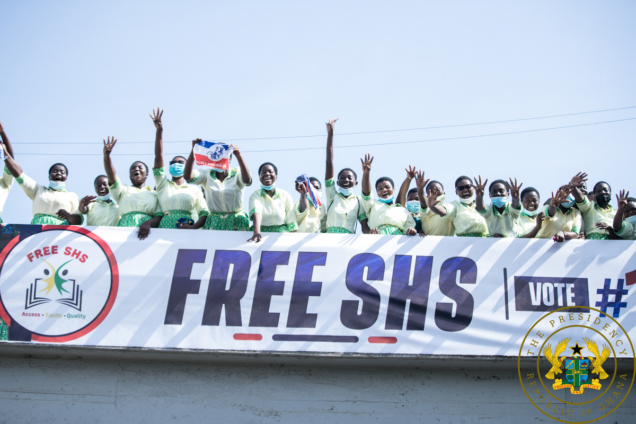The National President of the Ghana National Association of Teachers (GNAT) has expressed concern that the proposed introduction of the Free SHS Bill by the Akufo-Addo government is yet another instance of political interference in the country’s education system.
Rev Isaac Owusu suggested that the announcement of a new law appears to be politically motivated, driven by the government’s fear that a new party might overturn its flagship programme.
In an interview with Evans Mensah on PM Express, he argued that a new law is unnecessary as the country already has one in place.
He said, “So it is either you bring an LI to give more clarification on how to implement the Free SHS not propose a new bill.”
Rev Owusu questioned the relationship between the proposed bill and existing legislation, asking, “Is it going to replace ACT 1029 9, which talks about pre-tertiary education which includes secondary education, or it is going to stand on its own? Maybe until we see the content then we will understand what the Minister is talking about.”
His comments came after Education Minister Dr Yaw Adutwum announced that the Free SHS Bill, 2024, would be presented to the Cabinet for debate this week.
The proposed bill aims to provide legal backing for free and compulsory senior high school (SHS) education and introduces several changes to the education system, including the restructuring of junior high school (JHS) and the elimination of the Basic Education Certificate Examination (BECE) as a prerequisite for SHS admission.
Dr. Adutwum also mentioned that the BECE would be used solely for school selection purposes, rather than as a condition for admission to secondary education.
Once passed, the bill would make the SHS completion certificate the first formal certificate any student could obtain in the country, replacing the BECE certification.
He stated, “What we need is a law that says there should be free, compulsory universal secondary education. This means the minimum education for the Ghanaian should be a senior high school and not junior high school,” adding, “It is our responsibility to provide the support for them.”
Rev Owusu, however, views the bill as another instance of political manoeuvring, with little genuine concern for education.
He said, “We know both the NDC and NPP…when former President Kufour set up Prof Anamoah’s Committee to reform secondary education, the duration was moved from three years to four years. Also, the late President Atta Mills in his manifesto said if he wins power, it will revert to three years. So, the politicians know the game they are playing.”
He urged politicians to keep politics out of educational issues and to rely on experts for guidance and advice, making a passionate plea that “when it comes to educational issues, they should leave politics out of it and get the experts to guide and advise them accordingly.”
Latest Stories
-
‘We pampered them too long; now they’re biting,’ Franklin Cudjoe says of nurses’ strike
57 minutes -
EC to update Parliament on Ablekuma North deadlock this week
59 minutes -
Share a Coke magic of finding your name on the iconic bottle returns
1 hour -
See list of 25 private schools added to the free SHS programme
1 hour -
Coding is no longer enough: Why Africa needs AI literacy in every school
1 hour -
Ghana risks economic strain if Israel-Iran tensions escalate – Collins Adomako
1 hour -
Bridging the AI Education Gap: How African schools can leapfrog into the future
1 hour -
Today’s Front pages: Monday, June 16, 2025
1 hour -
Minority raise concerns over delayed disbursement of common funds
2 hours -
Appolonia City provides hot meals for BECE candidates in major CSR initiative
2 hours -
Dubai’s AI Operating System: A strategic blueprint for governments and future of African economies
2 hours -
Telecel Ghana Foundation brings healing and hope to James Camp Prison for Father’s Day
2 hours -
Help us improve our food systems – NAFCO appeals to WFP
2 hours -
Ahiagbah calls for Health Minister’s resignation over GRNMA strike
2 hours -
Attorney General’s NSA update serves public interest – Franklin Cudjoe
2 hours

